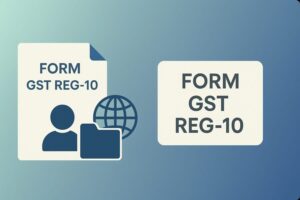GST Registration Delay Time Limit in India
- 23 Sep 25
- 10 mins
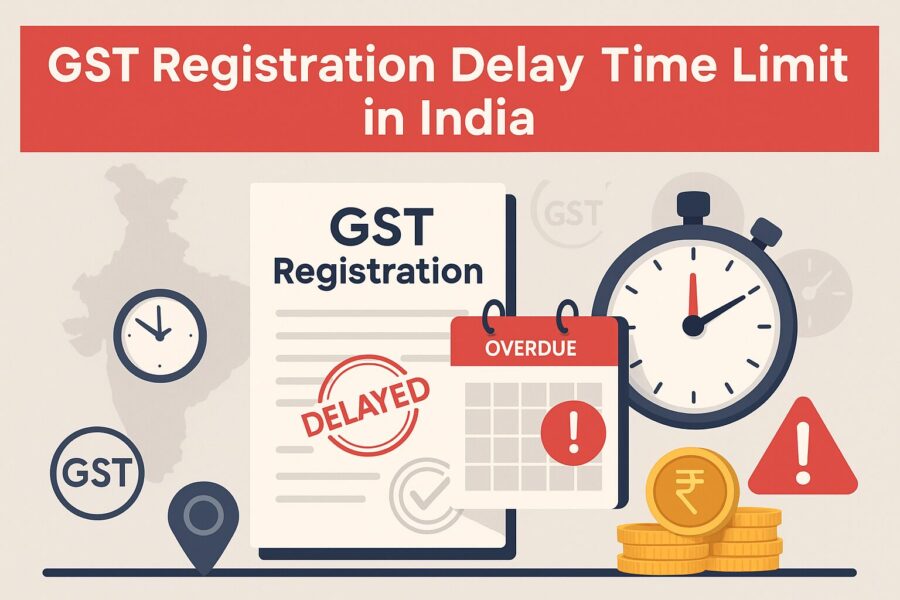
GST Registration Delay Time Limit in India
- Eligibility Criteria and the GST Registration Time Limit
- Navigating the 30-day GST Registration Time Limit for Regular Taxpayers
- Strategies for Ensuring Timely Compliance with the GST Registration Time Limit
- Addressing Registration Delays and Rectifications After the GST Registration Time Limit
- Staying GST Compliant for Business Success
- Conclusion
Key Takeaways
- Businesses must complete GST registration within 30 days of becoming liable to avoid penalties.
- The eligibility threshold for GST registration is ₹40 lakhs for goods and ₹20 lakhs for services (with lower limits for special states).
- Missing the GST registration deadline can lead to penalties, scrutiny, and loss of Input Tax Credit (ITC).
- Timely registration ensures compliance, smooth operations, and backdated effective registration benefits.
- Monitoring turnover and preparing documents early helps businesses stay GST compliant and penalty-free.
Did you know that missing the GST registration deadline could lead to hefty penalties and even legal consequences? If you are a business owner in India, understanding the GST registration time limit is not just good practice, it is essential for compliance and smooth operations.
With over 1.45 crore businesses registered under GST as of 2024 (CBIC), it is clear that timely registration is a priority for many.
Are you one of them? If your turnover exceeds the prescribed threshold, knowing the exact timeline to register can save you from unnecessary hassles.
So, let us explore everything you need to know about it in detail in the below sections.
Eligibility Criteria and the GST Registration Time Limit
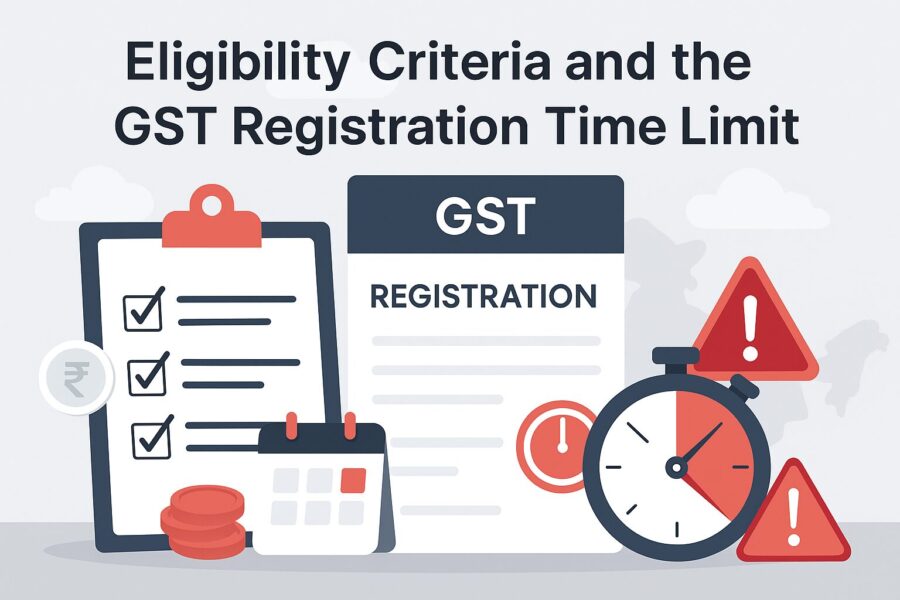
Understanding the eligibility conditions for GST registration is necessary for businesses. Let us explore the eligibility criteria and their connection with the GST registration time limit.
Eligibility Criteria for GST Registration:
The primary criteria for GST registration eligibility are your total annual turnover. The details regarding the eligibility criteria are elaborated below:
For Goods Suppliers: If your total turnover for exclusive supply of goods is above ₹40 lakhs in a financial year, GST registration is required. For special category states (Arunachal Pradesh, Manipur, Meghalaya, Mizoram, Nagaland, Puducherry, Sikkim, Telangana, Tripura, and Uttarakhand), the limit is ₹20 lakhs.
For Service Providers: If your turnover from aggregate services is more than ₹20 lakhs in a financial year, you are required to get registered under GST. For special category states, the threshold limit is ₹10 lakhs.
Mixed Supplies (Goods & Services): If you have both goods and service supply, the threshold for compulsory registration is ₹20 lakhs (₹10 lakhs for special category states).
Mandatory Registration (Irrespective of Turnover)
Even if your turnover is less than the prescribed limits, GST registration is mandatory in some situations:
- Inter-State Supplies: When you supply goods or services over state lines, there is a mandatory registration.
- E-commerce Operators: Companies who run an e-commerce platform have to register.
- Suppliers via E-commerce Platforms: When you sell goods or services via an e-commerce operator, registration is usually required (although some exceptions apply to small service providers).
- Casual Taxable Persons: Individuals or businesses occasionally supplying goods or services in a state where they have no fixed place of business.
- Non-Resident Taxable Persons: Foreign individuals or businesses making taxable supplies in India.
- Persons Liable to Pay Tax Under Reverse Charge Mechanism (RCM): Businesses receiving certain services where the recipient is liable to pay GST.
- Input Service Distributors (ISD): Entities distributing input tax credits among their branches.
- Persons registered under old laws: Businesses already registered under VAT, Service Tax, or Excise before GST implementation.
GST Registration Time Limit
Once your business becomes liable for GST registration, you must apply within 30 days from the date on which this liability arises. For casual taxable persons, the application must be filed at least five days before the commencement of business.
Consequences of Delay
Failing to register within the stipulated time can lead to penalties, which include a penalty of 10% of the tax due (with a minimum of ₹10,000) for genuine errors, and 100% of the tax due in cases of deliberate tax evasion. Furthermore, delayed registration means you cannot claim Input Tax Credit (ITC) on purchases made before your effective date of registration, potentially impacting your business's financial health.
Understanding these criteria and adhering to the time limits is paramount for smooth business operations and to avoid legal complications under the GST regime in India.
Navigating the 30-day GST Registration Time Limit for Regular Taxpayers
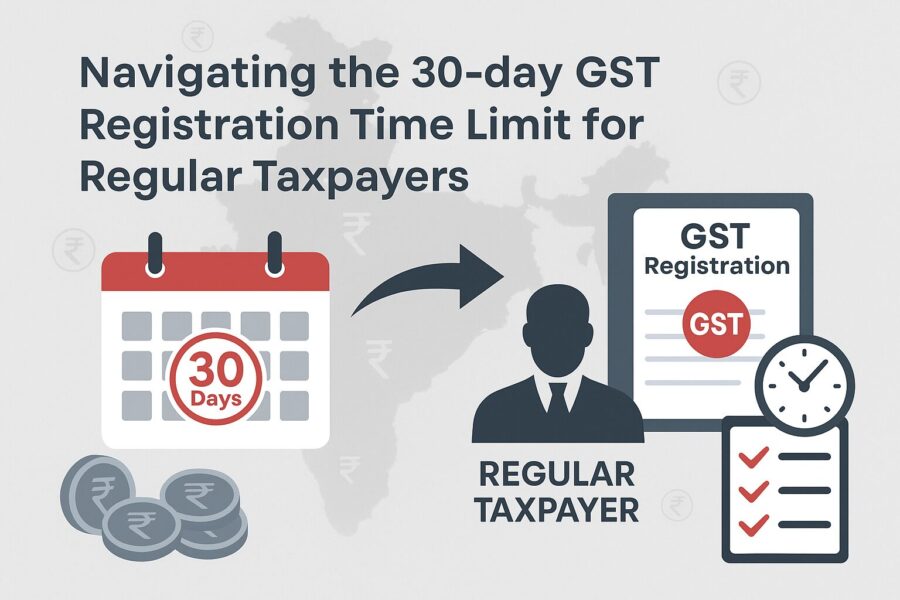
For businesses exceeding the annual turnover or those involved in inter-state supplies, on-time GST registration is a must. This section delves deep into the 30-day GST registration time limit applicable to regular taxpayers.
Significance of Maintaining the 30-day GST Registration Time Limit
- Avoidance of Penalty Charges
Registration within 30 days of becoming eligible for GST registration ensures maintaining compliance with regulations. Delays in the registration process exceeding the time limit can lead to penalties from respective tax authorities. These penalties can cause a financial burden for businesses.
- Smooth Operations
On-time registration enables businesses to collect GST on supplies and claim ITC on purchases. This thereby ensures maintaining a smooth flow of output taxes, preventing any disruptions in cash flow and business operations.
- Backdated Effective Date
This is another primary benefit of abiding by the 30-day GST registration time limit. Applying within 30 days enables your process of registration to be effective from the date you became eligible for GST registration.
Strategies for Ensuring Timely Compliance with the GST Registration Time Limit
For regular taxpayers, meeting the time limit of GST registration is crucial. Here are the applied strategies to follow in order to have a seamless and timely registration process:
- Monitoring Your Turnover Annually
Every enterprise must monitor its annual turnover throughout the year. This will assist them in realizing when they cross the limit value for GST registration. There are different accounting techniques to utilize for tracking turnover.
- Be Current on Threshold Adjustments
The government can alter the annual turnover threshold amount for GST registration. To remain current, check the official government websites periodically or subscribe to GST notifications to stay informed.
- Purchase Records and Keep Sales
The businesses are required to maintain the records of sales and their purchases. The records are composed of invoice number details, value of supply, date, rates of taxes, and HSN/SAC code for goods and services.
- Accounting Software
Think about accounting software for streamlining record keeping and GST registration. Such software can facilitate task automation like record keeping, creating invoices, calculating tax, and more.
- Preparation of Supporting Documents
The digital application of GST involves uploading requisite documents like an Aadhaar card, PAN card, proof of business address, account details, etc. These documents must be easily available on digital platforms to ensure a problem-free and hassle-free registration process.
Addressing Registration Delays and Rectifications After the GST Registration Time Limit
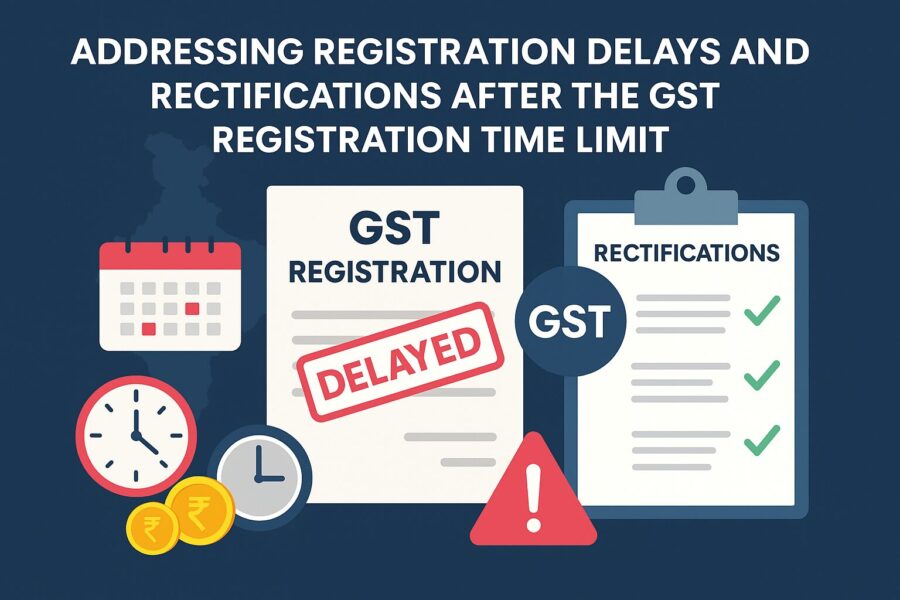
In unforeseen situations, businesses may lose the deadline of 30-day GST registration. However, even after crossing the 30-day window, businesses can register for GST. Because of the delay, here are some factors to consider:
- Penalty Charges : For late registration, the businesses will need to pay heavy penalties. The penalty amount varies as per the delay period and business turnover.
- Loss of Input Tax Credit (ITC): A delay in the registration process beyond the time limit can impose restrictions on claiming ITC applicable on previous purchases during the unregistered tenure, impacting your finances.
- Scrutiny by Tax Authorities: Crossing the GST registration time limit might lead to additional scrutiny from respective tax authorities. They might be involved in the investigation of your business activities. There are chances of errors in the registration application once submitted beyond the time limit of GST registration. Here are ways you can follow to address such situations:
- Filing for Rectification: The GST common portal allows businesses to file rectification of errors in the application process. This involves the on-time upload of relevant documents, along with application submission.
- Identification of Errors: Review your application form carefully or any communication obtained from authorities for identifying errors in details or submission of application documents.
- Processing Time : There might be a processing delay, which results thereby in a further extension of the registration timeline overall.
Staying GST Compliant for Business Success
The Goods and Services Tax (GST) plays a crucial role in the business landscape. On-time registration of GST is important for smooth operations. Here you will delve deep into the importance of meeting time limit for GST registration, allowing valuable insights for businesses to ensure compliance.
The importance of meeting the desired time limit of GST registration is as follows:
- Compliance and Avoidance of Penalty Charges
Abiding by the 30-day GST ensures businesses follow the regulations and avoid penalties for registering late. This leads to cost savings and also reduces the risk profile relating to legal complications.
- Backdated Effective Date of Registration
This is another significant benefit of meeting the desired time limit of GST online registration. By applying within a time frame of 30 days, businesses are eligible to claim ITC on eligible purchases before the date of registration.
- Streamlining Business Operations
Timely registration of GST number enables businesses to collect GST on supplies and claim ITC on purchases. This thereby helps in the facilitation of following a seamless flow of taxes, eliminating disruptions in the business operations and flow of cash.
Conclusion
Gaining an understanding of the GST registration time limit is essential for each business owner and professional in India. On-time registration not only helps maintain business compliance with tax laws but also builds trust with suppliers and customers.
Delaying the registration process can lead to penalties, late fees, and other challenges. By staying updated, you can focus on your business growth without worrying about problems.
💡If you want to streamline your payment and make GST payments via credit, debit card or UPI, consider using the PICE App. Explore the PICE App today and take your business to new heights.
 By
By 








